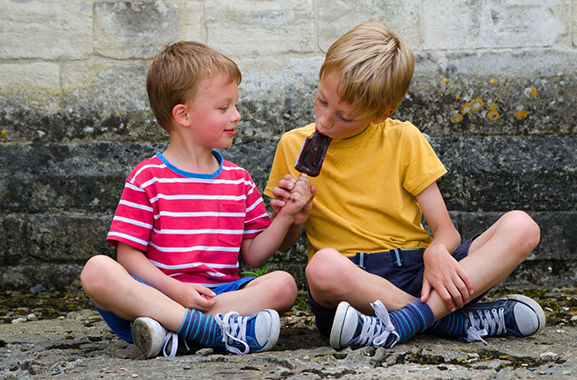Helping Children Learn That Sharing is Caring
Sharing is a vital skill in children's social development, helping them build relationships and foster empathy. While young children may struggle with the concept, understanding their challenges and implementing effective strategies can guide them toward becoming more cooperative and generous individuals.

Those seagulls in Finding Nemo only knew one word: "mine, mine, mine." The "mine" mantra is developmentally appropriate for children under the age of 5-6 but is also often embarrassing for parents.
Why Sharing Is Difficult for Children
There are several reasons why this skill is difficult for children:
- To share (and be fair) makes sense cognitively. They can explain it. But they lack the counting skills to share equitably. It's literally that simple.
- To share (and be fair) also requires perspective - what psychology researchers call "theory of mind". The ability to fully understand perspectives kicks in between 5 and 7 years of age. Sharing at any age younger than this is developmentally difficult.
- It requires "frustration tolerance" - sacrifice is needed when giving something up, even for a short amount of time. Young children struggle to tolerate these feelings of frustration and are less likely to share.
- A sense of ownership develops from somewhere around age 3. A fear of loss may also impact children's willingness to share. Competing for limited resources, inherently tied to the "survival of the fittest" mindset, compels selfishness over selflessness.
Strategies for Parents to Encourage Children to Share
Parents who want their children to share can help by:
- Teaching empathy through one-on-one talks where perspective-taking is practiced. "How did your sister feel when you said no?" "How might she feel if you responded by sharing?"
- Modelling sharing behaviour by being abundant and 'light' with others, including your children.
- Encouraging kids to talk about their feelings during conflicts and celebrating sharing experiences, which amplifies its importance. Talking about positive experiences (and kindness more generally) at meal times models and celebrates sharing.
- Inviting children to participate in acts of service, like donating toys or clothes, where they can feel the joy of giving.
- Using turn-taking to provide children with positive experiences of letting go of something valuable and having it returned.

Balancing Encouragement and Autonomy
A tricky balance exists between encouraging sharing and respecting a child's autonomy. Imposing this behaviour can backfire, fuelling resentment. When forced to share, children potentially experience loss, powerlessness, and subsequent frustration.
Age-Appropriate Strategies for Sharing
For Children Under 5:
Practising sharing, developing empathy, and teaching some basic numeracy will be helpful. But keep expectations low.
For Children Over 5:
Discuss sharing ahead of playdates, talk about positive sharing experiences, and communicate the value of sharing to build a positive picture of it where possible.
My Child Won't Share...Yet
Helping your child learn to share is essential for their social development and empathy. By using these strategies and fostering open communication, you can create a positive sharing environment. For more parenting tips, explore additional resources on child development and emotional learning.
Article by Dr Justin Coulson
Published March 6, 2024
Published by Happy Families